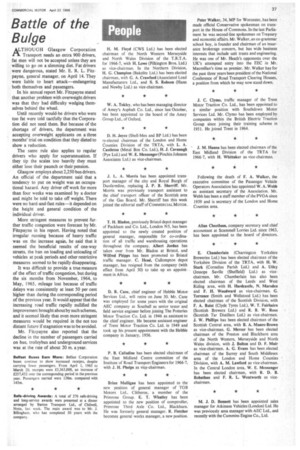Battle of the Bulge
Page 39

If you've noticed an error in this article please click here to report it so we can fix it.
ATHOUGH Glasgow Corporation Transport needs an extra 900 drivers, fat men will not be accepted unless they are willing to go on a slimming diet. Fat drivers were dangerous, stated Mr. E. R. L. Fitzpayne, general manager, on April 14. They were liable to heart attack—endangering both themselves and passengers.
In his annual report Mr. Fitzpayne stated that another problem with overweight drivers was that they had difficulty wedging themselves behind the wheel.
Until recently would-be drivers who were too fat were told tactfully that the Corporation did not need them. But because of the shortage of drivers, the department was accepting overweight applicants on a three months' trial on condition that they dieted to show a reduction.
The same rule also applies to regular drivers who apply for superannuation. If they tip the scales too heavily they must either lose their paunch or their pension.
Glasgow employs about 2,250 bus drivers. An official of the department said that a tendency to put on weight was an occupational hazard. Any driver off work for more than four weeks was examined by a doctor and might be told to take off weight. There were no hard-and-fast rules—it depended on the height and general condition of the individual driver.
More stringent measures to prevent further traffic congestion were forecast by Mr. Fitzpayne in his report. Having noted that irregular running because of heavy traffic was on the increase again, he said that it seemed the beneficial results of one-way streets, the ban on loading and unloading of vehicles at peak periods and other restrictive measures seemed to be rapidly disappearing.
It was difficult to provide a true measure of the effect of traffic congestion, but during the six months from November, 1964, to May, 1965, mileage lost because of traffic delays was consistently at least 50 per cent higher than during the corresponding period of the previous year. It would appear that the increasing road traffic rapidly nullified the improvement brought aboutby such schemes, and it seemed likely that even more stringent measures would be required in the not too distant future if stagnation was to be avoided.
Mr. Fitzpayne also reported that the decline in the number of passengers carried on bus, trolleybus and underground services was at the rate of about 20 m. a year.




























































































































